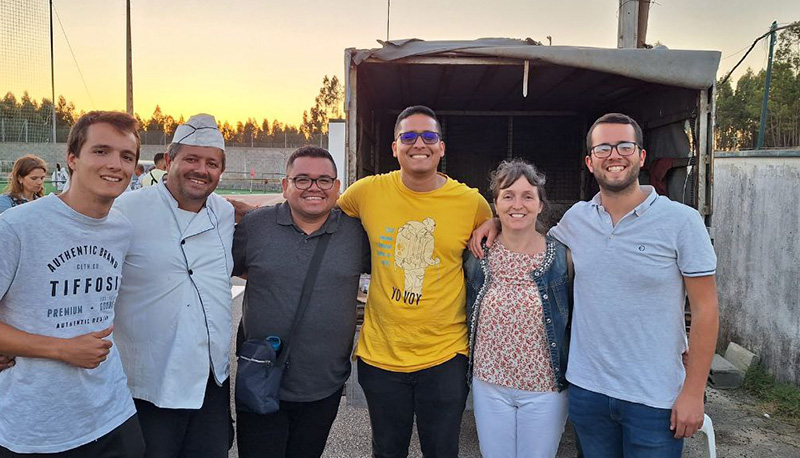
Jorman is the only son in his family, the youngest of three sisters. His parents had decided to emigrate to Colombia, when they were surprised by his intention to enter the seminary to become a priest. They told him that, if he stayed in VenezuelaThey would also remain in the country. "But I told them that the best thing was for them to join my sisters in Colombia, because they were going through a delicate economic situation".
is now very proud of him. They are Catholic and, although it came as a surprise at first, they supported him in his decision, convinced that saying yes to God is not an easy answer. But Jorman had not always been so clear.
Until entering the seminarHe went through several stages. His vocational process was progressive. It began as a child, when he participated in the pontifical works of his country, in Missionary Childhood. In his youth years he was involved in Youth Mission, where he was the diocesan coordinator of youth ministry.
In Young Mission, he felt that God wanted him to serve Him, to leave everything for Him, but he did not want to listen to His voice. So, to drown out God's voice, he preferred to meet some girls, something like going from girlfriend to girlfriend. Until he shared with one of them his desire to enter the seminary. If it wasn't his thing, they would get back together. She supported him unconditionally, a very important gesture for Jorman.
During the pandemic, God's voice echoed more loudly in her heart. "The quietness in my home, with my family, made me restless inside. I had left behind the vortex of my life and I had time and calm to listen to God. It was then that I decided to begin my process vocational in a online".
Later, during a vocational retreat, he kept repeating that he wanted to do God's will: "I have avoided you a lot, Lord, but even if it costs my life, it is yours". It was a stage of certain doubts that dissipated when the rector of the seminary asked him if he finally wanted to be formed as a seminarian. "I said yes, and I imagined Mary's yes. Then, the whole earth paused, there was total silence around me".
The first year of the seminary was very hard. He was plagued by sadness and doubts. He was very tired and felt very far from his family. At a Holy Hour he surrendered to God: "May your will be done, I have no strength, I only count on yours". He asked for a signal. I needed to know if God really wanted me to be a priest.
A few days later, the Vicar General of the diocese told him: "The Bishop has chosen you to study at the University of Navarra and to stay at the Bidasoa Seminary in Spain". And at that moment, the light erased his anguish. He was in shock. "I didn't see myself as capable of studying in Spain, but it came to my mind that this was the sign I had asked God for. So I accepted."
God's dream
Now, at the age of 25, he finds himself in the Bidasoa International Seminar fulfilling his dream and "the dream that God has for me. God has dreams for everyone and we just have to accept and receive them".
He is convinced that his yes to God and to the training The integral formation that he is receiving in Pamplona, will contribute to help the people of Venezuela. "In my country, the Catholic Church is mediating as a channel of dialogue in the face of the polarization of the people and the institutions. But, above all, with the social pastoral and accompanying the faithful so that they are not helpless in their struggles."
And the fact is that young people priests of the 21st century have a very concrete mission, each one in his own destiny. For Jorman, they must be "creative and ingenious, with a very good doctrinal formation and a deep interior life" capable of transmitting with new methods and forms what they have received.
"I think the main difficulties for a priest today lie in finding effective ways to connect with people in an increasingly secularized and digitized society."
Marta SantínJournalist specializing in religious information.